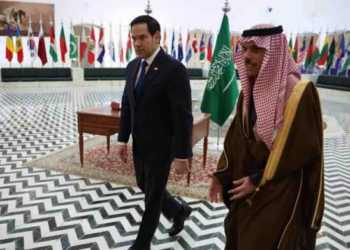
President Joe Biden revealed that the United States has destroyed the last of its reported chemical weapons stockpile, bringing an end to a chapter of conflict that dates back to World War I.
Workers at the Blue Grass Army Depot in Kentucky destroyed rockets containing GB nerve agent, better known as sarin, on Friday, completing a decades-long campaign to eradicate a stockpile that totaled more than 30,000 tonnes by the end of the Cold War.
In a White House statement, Biden said the move brings “us one step closer to a world free from the horrors of chemical weapons”.
“I am grateful to the thousands of Americans who gave their time and talents to this noble and challenging mission for more than three decades,” he said. “Today—as we mark this significant milestone—we must also renew our commitment to forging a future free from chemical weapons.”
Republican Senate minority leader Mitch McConnell said on Friday that “chemical weapons are responsible for some of the most horrific episodes of human loss”.
The United States faced a September 30 deadline to remove its residual chemical weapons
“Though the use of these deadly agents will always be a stain on history, today our nation has finally fulfilled our promise to rid our arsenal of this evil,” McConnell said in a statement.
Under the International Chemical Weapons Convention, which went into effect in 1997 and was signed by 193 countries, the United States faced a September 30 deadline to remove its residual chemical weapons.
Chemical weapons were deployed for the first time in modern combat during World War I, killing at least 100,000 people.
Despite the Geneva Convention prohibiting their use, governments continued to stockpile the weapons until the treaty required for their elimination.
They have also been utilized in modern warfare, most notably by Iraq during its 1980s fight with Iran, and more recently in the Syrian war.
US personnel at the Army Pueblo Chemical Depot in southern Colorado began eliminating the weapons in 2016, and on June 22, they finished their task of neutralizing an entire cache of around 2,600 tonnes of mustard blister agent.
What is the process of destroying the chemical weapons?
The community surrounding Kentucky’s Blue Grass Army Depot objected to the Army’s initial proposal to incinerate the plant’s 520 tonnes of chemical weapons in the 1980s, resulting in a decades-long struggle over how they would be disposed of.
They were able to block the proposed incineration factory and then, with the assistance of parliamentarians, persuade the Army to submit alternate ways for disposing of the weapons.
Kentucky’s disposal plant was finished in 2015, and it began eliminating weapons in 2019 using a process known as neutralization, which dilutes the lethal substances so they may be properly disposed of.
To dispose of the mustard blister agent, robotic equipment removed the weapons’ fuses and bursters before neutralizing the mustard agent with hot water and mixing it with a caustic solution to prevent the reaction from reversing.
The waste was further broken down in enormous tanks filled with bacteria, and the mortars and bullets were decontaminated and recycled as scrap metal at 538 degrees Celsius (1,000 degrees Fahrenheit).
Leaky or overpacked weapons were sent to an armored, stainless steel explosion chamber to be destroyed at high temperatures.
Only three countries have not signed the treaty: Egypt, North Korea, and South Sudan
The Colorado and Kentucky sites were the last of four, including Utah and the Pacific Ocean’s Johnston Atoll island, where the country’s chemical weapons had been stockpiled and destroyed. Other locations included Alabama, Arkansas, and Oregon.
The destruction of the last US chemical weapon “will close an important chapter in military history, but one that we’re very much looking forward to closing”, said Kingston Reif, an assistant US secretary of defense for threat reduction and weapons control.
According to officials, the destruction of the US stockpile represents a significant step forward for the Chemical Weapons Convention. Only three countries have not signed the treaty: Egypt, North Korea, and South Sudan. Israel is the fourth country to have signed but not ratified the treaty.





